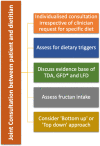Diet and irritable bowel syndrome: an update from a UK consensus meeting
- PMID: 36096789
- PMCID: PMC9469508
- DOI: 10.1186/s12916-022-02496-w
Diet and irritable bowel syndrome: an update from a UK consensus meeting
Abstract
There has been a renewed interest in the role of dietary therapies to manage irritable bowel syndrome (IBS), with diet high on the agenda for patients. Currently, interest has focussed on the use of traditional dietary advice (TDA), a gluten-free diet (GFD) and the low FODMAP diet (LFD). A consensus meeting was held to assess the role of these dietary therapies in IBS, in Sheffield, United Kingdom.Evidence for TDA is from case control studies and clinical experience. Randomised controlled trials (RCT) have demonstrated the benefit of soluble fibre in IBS. No studies have assessed TDA in comparison to a habitual or sham diet. There have been a number of RCTs demonstrating the efficacy of a GFD at short-term follow-up, with a lack of long-term outcomes. Whilst gluten may lead to symptom generation in IBS, other components of wheat may also play an important role, with recent interest in the role of fructans, wheat germ agglutinins, as well as alpha amylase trypsin inhibitors. There is good evidence for the use of a LFD at short-term follow-up, with emerging evidence demonstrating its efficacy at long-term follow-up. There is overlap between the LFD and GFD with IBS patients self-initiating gluten or wheat reduction as part of their LFD. Currently, there is a lack of evidence to suggest superiority of one diet over another, although TDA is more acceptable to patients.In view of this evidence, our consensus group recommends that dietary therapies for IBS should be offered by dietitians who first assess dietary triggers and then tailor the intervention according to patient choice. Given the lack of dietetic services, novel approaches such as employing group clinics and online webinars may maximise capacity and accessibility for patients. Further research is also required to assess the comparative efficacy of dietary therapies to other management strategies available to manage IBS.
Keywords: Gluten-free diet; Irritable bowel syndrome; Low FODMAP diet; Traditional dietary advice.
© 2022. The Author(s).
Conflict of interest statement
DSS receives an educational grant from Schaer (a gluten-free food manufacturer). Dr Schaer did not have any input in drafting of this manuscript. The other authors declare they have no competing interests.
Figures
Similar articles
-
Efficacy and Acceptability of Dietary Therapies in Non-Constipated Irritable Bowel Syndrome: A Randomized Trial of Traditional Dietary Advice, the Low FODMAP Diet, and the Gluten-Free Diet.Clin Gastroenterol Hepatol. 2022 Dec;20(12):2876-2887.e15. doi: 10.1016/j.cgh.2022.02.045. Epub 2022 Feb 28. Clin Gastroenterol Hepatol. 2022. PMID: 35240330 Clinical Trial.
-
Clinical application of dietary therapies in irritable bowel syndrome.J Gastrointestin Liver Dis. 2018 Sep;27(3):307-316. doi: 10.15403/jgld.2014.1121.273.avy. J Gastrointestin Liver Dis. 2018. PMID: 30240475 Review.
-
Current evidence for dietary therapies in irritable bowel syndrome.Curr Opin Gastroenterol. 2023 May 1;39(3):219-226. doi: 10.1097/MOG.0000000000000930. Epub 2023 Mar 1. Curr Opin Gastroenterol. 2023. PMID: 36976876 Review.
-
Dietetic Management of Irritable Bowel Syndrome: A National Survey of Dietary Approaches and Decision-making Factors.J Gastrointestin Liver Dis. 2024 Jun 29;33(2):177-183. doi: 10.15403/jgld-5466. J Gastrointestin Liver Dis. 2024. PMID: 38944865
-
Gluten-Free Diet and Its 'Cousins' in Irritable Bowel Syndrome.Nutrients. 2018 Nov 11;10(11):1727. doi: 10.3390/nu10111727. Nutrients. 2018. PMID: 30423854 Free PMC article. Review.
Cited by
-
Efficacy of Different Dietary Patterns in the Treatment of Functional Gastrointestinal Disorders in Children and Adolescents: A Systematic Review of Intervention Studies.Nutrients. 2023 Jun 10;15(12):2708. doi: 10.3390/nu15122708. Nutrients. 2023. PMID: 37375612 Free PMC article.
-
Food Intolerances, Food Allergies and IBS: Lights and Shadows.Nutrients. 2024 Jan 16;16(2):265. doi: 10.3390/nu16020265. Nutrients. 2024. PMID: 38257158 Free PMC article. Review.
-
Is the Mediterranean Low Fodmap Diet Effective in Managing Irritable Bowel Syndrome Symptoms and Gut Microbiota? An Innovative Research Protocol.Nutrients. 2024 May 23;16(11):1592. doi: 10.3390/nu16111592. Nutrients. 2024. PMID: 38892525 Free PMC article.
-
Effect of the combined intervention of low-FODMAPs diet and probiotics on IBS symptoms in Western China: A randomized controlled trial.Food Sci Nutr. 2024 Feb 29;12(6):3993-4004. doi: 10.1002/fsn3.4057. eCollection 2024 Jun. Food Sci Nutr. 2024. PMID: 38873474 Free PMC article.
-
A Multicenter Randomized Controlled Trial of Microbiome-Based Artificial Intelligence-Assisted Personalized Diet vs Low-Fermentable Oligosaccharides, Disaccharides, Monosaccharides, and Polyols Diet: A Novel Approach for the Management of Irritable Bowel Syndrome.Am J Gastroenterol. 2024 Sep 1;119(9):1901-1912. doi: 10.14309/ajg.0000000000002862. Epub 2024 May 8. Am J Gastroenterol. 2024. PMID: 38717025 Free PMC article. Clinical Trial.
References
-
- Sperber AD, Bangdiwala SI, Drossman DA, et al. Worldwide prevalence and burden of functional gastrointestinal disorders, results of Rome Foundation Global Study. Gastroenterology. 2020. 10.1053/j.gastro.2020.04.014. - PubMed
-
- Halpert A, Dalton CB, Palsson O, et al. What patients know about irritable bowel syndrome (IBS) and what they would like to know. National Survey on Patient Educational Needs in IBS and development and validation of the Patient Educational Needs Questionnaire (PEQ) Am J Gastroenterol. 2007;102(9):1972–1982. doi: 10.1111/j.1572-0241.2007.01254.x. - DOI - PubMed
-
- Sturkenboom R, Keszthelyi D, Masclee AAM, Essers BAB. Discrete choice experiment reveals strong preference for dietary treatment among patients with irritable bowel syndrome. Clin Gastroenterol Hepatol. 2022. 10.1016/j.cgh.2022.02.016. - PubMed
MeSH terms
Substances
LinkOut - more resources
Full Text Sources


